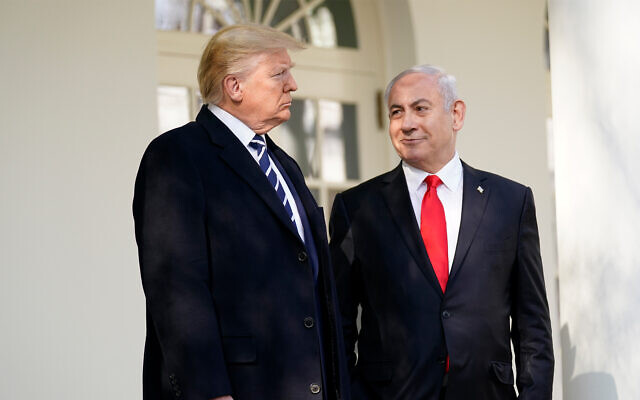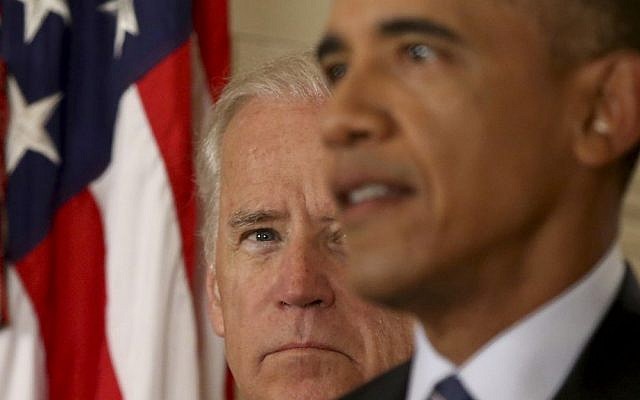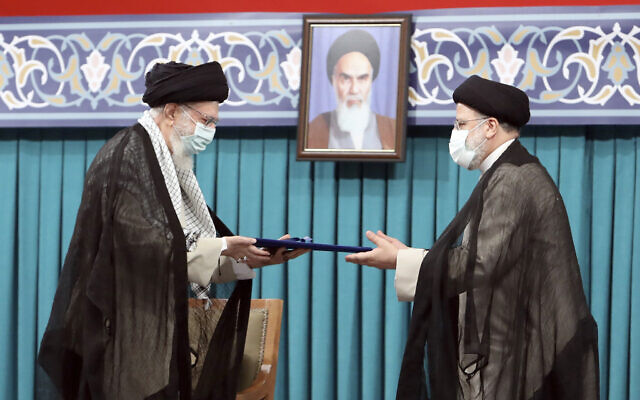Having failed in his high-profile efforts to dissuade the Obama administration from sealing the radically inadequate 2015 deal with Iran, prime minister Benjamin Netanyahu’s subsequent strategy for thwarting the ayatollahs’ nuclear weapons drive relied on a series of calculated judgments or, perhaps more accurately, gambles.
First, Netanyahu encouraged the Trump administration’s withdrawal from the accord, and its imposition of “maximum pressure” sanctions, in the belief or hope that a combination of economic pressure, consequent domestic unrest, and the threat of US-led military action might compel the regime to set aside its bid for the bomb.
Second, he relied on the Trump administration being prepared to take military action, or support and help facilitate Israeli military action, if the point arrived where nothing else could halt Tehran’s military nuclear program — and if, in the curt, graphic summation of the late Mossad chief Meir Dagan, the sword was at our throat.
And self-evidently, by extension, Netanyahu bet on Donald Trump retaining the presidency, rather than losing out to a Democratic rival likely to seek to reinstate the 2015 JCPOA (Joint Comprehensive Plan of Action).
Needless to say, the strategy failed. A regime indifferent to the well-being of its citizenry so long as its hold on power was secure resisted the sanctions pressure and, predictably, began openly breaching the already lax parameters of the JCPOA. Allowed under the terms of the deal to keep many of its centrifuges and continue research on more effective models, it developed and installed some of those more efficient designs, and has gradually enriched increasing quantities of uranium to increasingly high levels — now a short hop away from weapons-grade.
Breaching the deal’s porous clauses on UN inspections, Tehran has also restricted and even booted the International Atomic Energy Agency’s teams from some of the facilities that would have been dismantled under an effective agreement. Now nobody knows what the regime is up to in facilities that we are aware of, much less what progress it may be making on weaponization and delivery in facilities we know little or nothing about.

US President Donald Trump, left, and Prime Minister Benjamin Netanyahu walk to a meeting in the Oval Office of the White House, January 27, 2020. (AP Photo/ Evan Vucci)
Netanyahu’s high-risk strategy was founded on the debatable but not untenable conviction that the bad 2015 deal was worse than no deal at all. What was untenable, but is acknowledged at the most senior levels of the Israeli security establishment, is that after the deal was signed, Israel failed to continually update its planning and training for a possible resort to force. And worse, that the political leadership did not allocate sufficient funding, and the security establishment did not mount sufficient pressure on its political masters, to ensure Israel was as ready and able as possible to militarily counter Iran’s ongoing march to the bomb after Trump withdrew from the deal in 2018 and the Iranians began openly breaching its terms.
Thus Israel today finds itself playing frantic military catch-up, rushing to develop fresh operational plans for thwarting an Iran that is widely assessed to be capable of enriching sufficient quantities of weapons-grade uranium for a bomb within weeks if it so chooses, and whose timescale for finalizing weaponization and delivery is anybody’s guess.

US Vice President Joe Biden listens as President Barack Obama delivers remarks in the East Room of the White House in Washington, July 14, 2015, after an Iran nuclear deal is reached. (AP Photo/Andrew Harnik, Pool)
There should be no forgetting: The original sin, in the dismal saga of a genocidal regime’s march to the bomb and a feckless free world’s inability to thwart it, was that 2015 accord — whose incomplete provisions and sunset clauses failed to meet the vital objective: dismantling the rogue nuclear weapons program of a predatory regime that openly and relentlessly seeks the elimination of the State of Israel and threatens the free world, and ensuring that this program could not be resurrected.
The challenge now, as a consequence, is to thwart an emboldened and much-advanced, almost-nuclear Iran, starting from a far less promising negotiating position than was the case in 2015. But as the US and Iran resumed indirect negotiations in Vienna this week, there was no sign that the Biden administration — which has indicated a profound desire to return to that deficient accord — is willing to galvanize the kind of pressure that might give the ayatollahs pause.
For all its warm promises of solidarity with its great ally Israel, and Biden’s public commitment to Prime Minister Naftali Bennett in the Oval Office in August “to ensure Iran never develops a nuclear weapon,” the president and his team prefer to not even talk about a military option if diplomacy fails, choosing instead to speak vaguely of “other options.”

Iran’s Supreme Leader Ayatollah Ali Khamenei, left, gives his official seal of approval to newly elected President Ebrahim Raisi in an endorsement ceremony in Tehran, Iran, August 3, 2021. (Office of the Iranian Supreme Leader via AP)
That goes to the root of the US-led refusal to fully internalize the nature of the enemy regime in Tehran and the dangers it poses. The regime halted much of its nuclear program in 2003, after the US invaded Iraq, fearing that it might be the Americans’ next target. Halted, not dismantled, as the Mossad’s breathtaking 2018 plunder of its Tehran nuclear weapons archive underlined.
Nothing short of a credible military threat — not maximum economic pressure, and certainly not indirect negotiations with a US administration that has its heart set on a deal — is going to deter the ideologically and territorially rapacious ayatollahs now.
And thus we lurch ever closer to the unthinkable denouement that Israel has tried for so long to warn the world against: the stark choice between a nuclear Iran and a desperate resort to military force to try to stop it.
—
** This Editor’s Note was sent out Wednesday in ToI’s weekly update email to members of the Times of Israel Community. To receive these Editor’s Notes as they’re released, join the ToI Community here.
"current" - Google News
December 02, 2021 at 11:07AM
https://ift.tt/3d7nNKu
Iran — the gamble, the original sin, and the unthinkable current consequence - The Times of Israel
"current" - Google News
https://ift.tt/3b2HZto
https://ift.tt/3c3RoCk
Bagikan Berita Ini














0 Response to "Iran — the gamble, the original sin, and the unthinkable current consequence - The Times of Israel"
Post a Comment